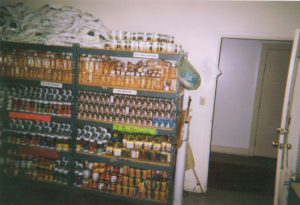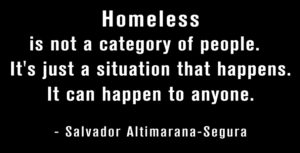January 5, 2021 at 8:53 pm

A food pantry is what it is because of three things:
the economic situation at the moment
the volunteers
the people who shop there.
The people come together looking for groceries but often, they want and need far more.
While the coronavirus pandemic rages, the food pantry lines get longer every pantry day because people, families, deal with change they didn’t ask for.
In short, they are rewriting their destiny stories without a road map or instructions.
A number of the people in the pantry, both shoppers and volunteers, didn’t know about food pantries until circumstances set up a situation where they suddenly looked around a room and realized where they were.
There is a name for their category – SITUATIONAL POOR.
A person fits into the situational poor category when s/he lands in a situation created by an event such as a hurricane, fire, floor, pandemic, or other disaster which destroys the home, car, job.
Pantries offer much – peace, community, spiritual connection, groceries. I always think of a food pantry in the basement of a church as a cross between a church service and a busy pizza place.
A food pantry, and those connected with it, are not a program. They are a community. As volunteers, all we really do is open the door. As all the hungry people walk through the door, they undergo a change somehow.
Each person in a pantry, in whatever capacity, has experienced rejection in some way – too young, too old, too crazy, too sick, too poor, not poor enough.
The food pantry experience does not heal a person, nor does it change the story.
The food pantry experience does not offer therapy.
The food pantry is, instead, a conduit for each person’s own healing.
FOOD PANTRY RULES
Sign your name in the register as you enter the pantry.
Find a place in line.
Do not crowd or block the door to the pantry room.
No more than 2 shoppers are allowed in the pantry at one time.
No more than one new shopper is allowed in the pantry at one time.
Shop for a three-day supply of food for everyone in your household.
Place your selections on the table as you shop.
Respect the restrictions on certain foods.
Finish your shopping in 10 minutes.
Once you begin to bag your groceries, do not continue to shop.
Because the food availability is different each time you shop, it is best to visit the food pantry weekly.
Thank you.
Thurman Greco
P.S. The rules may be different at the pantry where you shop. Each food pantry is different. The space is different. The times the pantry is open is different. The management is different.
These specific rules were used in the food pantry I managed where the people were many, the space small, and the hours few.
Please forward this article to your preferred social media network.
Share it with your friends.




August 20, 2014 at 6:30 am
I’m sorry I’m late to work in the pantry today Thurman. I promise it won’t happen again. I was over at the pet store until just now unpacking and stacking the dog food. They gave me food for Chloe and Freedy in exchange for working today. I promise it won’t happen again.”
“Alice, don’t worry at all. Robyn happened by. Sometimes I think this pantry is charmed. People always surface when we need them. It’s very important for you to get pet food and you know how the building committee feels about pet food in the pantry.”
WHY ARE SO MANY PEOPLE IN NEED OF A PANTRY? Why are there so many people in our country today? What is happening?
Employment opportunities are a large part of the problem. People find themselves down and out in places where there are few jobs. Young people graduate from high school or college and can’t find employment.
The downturn of 2008 erased many job opportunities. When the economy finally does recover, many of these jobs won’t be returning. My fear is that the recovery will create a new, large class of citizens permanently living in the poverty of underemployment and unemployment.
WE’VE ALREADY GOT A TERM FOR THIS GROUP: THE STRUGGLING CLASS.
Education costs are a factor. Fewer and fewer people can afford college these days. Some are afraid of the college loans they might not be able to pay off. One young woman in our line works 60 hours weekly in low wage jobs to repay her loan.
A fairly common question I hear in the pantry line is “Are you working on or off?” What they’re finding out with the question is how many hours a person is working on the books and how many hours off the books. Not only is this illegal but it’s robbing our younger generation of any benefit accrual, and the opportunity to pay taxes.
I ALSO HEAR STORIES ABOUT PEOPLE WHO HAVE HAD THEIR WAGES STOLEN BY EMPLOYERS. HUNGER ACTION NETWORK DESCRIBES THIS AS AN EPIDEMIC.
Our country needs to make a few fundamental attitude adjustments.
One important shift is to realize that food stamps, food pantries, soup kitchens, shelters are no longer emergency concepts. They are a new way of life in 21st century America. When we accept this fact, the shame factor will be removed and seniors and children will sleep better at night unaccompanied by their old friend hunger.
Thank you for reading this blog/book.
Please refer this article to your preferred social media network.
Please send a comment.
Don’t forget to join my mailing list.
Peace and food for all.
Thurman










